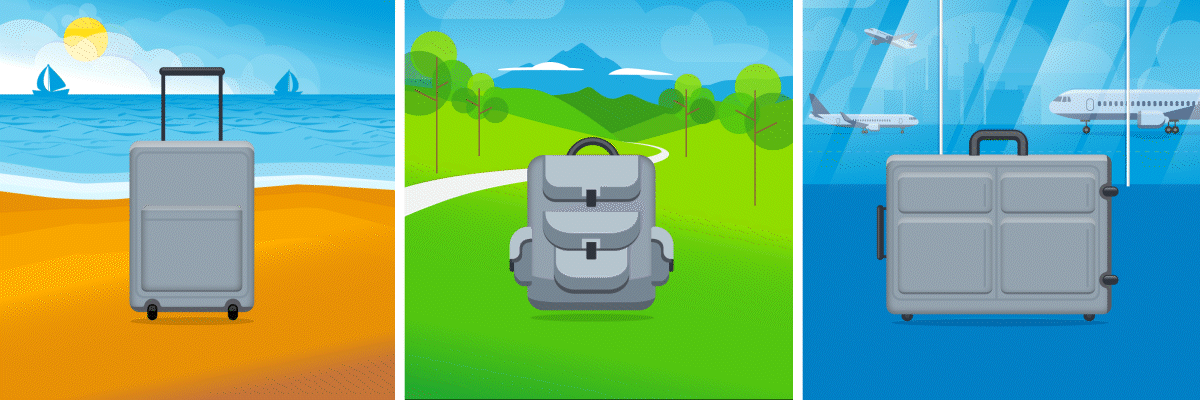Everyone looks forward to “getting away.” And with summer travel season here, these trips can be exciting and special. While you might let your hair down, don’t let your guard down, too.

You’ve probably heard these stories – or maybe they happened to you:
- Your family enjoys a relaxing day at the beach when a phone slips out of a bag, falls into water and sends you off to find the nearest provider store for a new phone. How will you get that data back?
- You return home and find charges on an account that you didn’t make. How did that happen?
When traveling, you and your devices come in contact with strangers, both human and digital. Whether a pop-up vendor on a busy street or public Wi-Fi network at the coffee shop close to your hotel, these interactions can also present risks.
As people begin to travel more, for business and vacation, maintaining strong cybersecurity practices will help keep you and your information safe.
Consider the following tips to help prevent your personal data or devices from falling in the wrong hands. Before you fasten your seatbelt, check into your hotel or apply your sunscreen, there are steps you can take while planning a trip that will help set you up for safe travel.

Prepare yourself and devices for your trip
- Back up your device data. Should one of your devices get stolen, lost or damaged during travel, having a backup of data stored in a cloud database can help restore the data. This allows things like contact information, pictures, and calendar appointments to be quickly loaded to a new device and not lost forever. AT&T Personal Cloud is one option, and most devices make this feature available in their settings, such as iCloud and Google Drive.
- Update security features. Before a trip, make sure your device’s software and security apps are the most current versions. Check for any security updates you may have missed and install them.
- Set up multi-factor authentication. Usernames and passwords are important for security but adding another “factor” is even better. This additional authentication could be something you know, like a PIN number, something you have, like a security key, or something you are, like facial recognition.
- Use verified sites and payment systems. As you browse for hotels, short-term rentals or other services during your travel, be sure the sites you visit are legit before entering in payment and personal information. Check the URL on any site you visit to make sure it is secure, as the domain name should begin with “https” – the “s” signifying a secure site.

Be mindful of your belongings and surroundings as you travel
- Keep devices close. Never leave a device unattended. Bad guys can snatch your device or record important personal information when you’re not looking. Make sure you have a lock screen password and timed intervals for devices to lock when not used.
- Don’t relax your privacy while relaxing. Public internet and charging kiosks can be convenient, but they can pose security risks because you never know who else is connected. When using public Wi-Fi networks, make sure you are on the correct network and avoid doing transactions on it unless you have a VPN to encrypt your sensitive online traffic, like passwords and account information. Instead of plugging your device into a publicly used charger cable, keep your own in your bag or use a portable battery. Avoid using public computers, especially to access accounts or make payments.
- Prevent old-school snooping. Be aware of your surroundings when discussing or looking at private or sensitive information in public. People may hear what you say or see information on your device.

Watch for unusual account behavior after your trip
- Check your bank accounts and other paid services. Once you return home, monitor your accounts to make sure that no unusual or fraudulent charges appear. If you see unexpected behavior, reach out to your provider and change the passwords on any affected accounts.
- Monitor your devices for malware. Unusual pop-ups, add-ons or sluggish performance can be signs of malware on your device. To protect yourself, use updated anti-virus and anti-spyware programs, delete unused applications and be mindful of what files you download. Making device hygiene a habit can also help keep your devices safe from malware and other threats.. Be aware of your surroundings when discussing or looking at private or sensitive information in public. People may hear what you say or see information on your device.
Traveling brings fun and new experiences. Using trusted security practices will help keep avoidable stresses like a lost phone or stolen documents off your mind. Before your next venture, consider these steps and review our Top 5 Tips for more security recommendations you can use for both travel and everyday life.
PR Archives: Latest, By Company, By Date